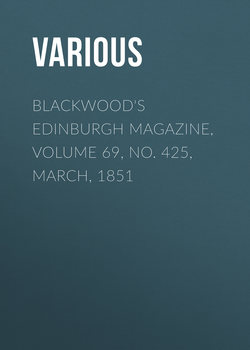Читать книгу Blackwood's Edinburgh Magazine, Volume 69, No. 425, March, 1851 - Various - Страница 3
MY NOVEL; OR, VARIETIES IN ENGLISH LIFE
BY PISISTRATUS CAXTON
CHAPTER II
ОглавлениеMatrimony is certainly a great change in life. One is astonished not to find a notable alteration in one's friend, even if he or she have been only wedded a week. In the instance of Dr and Mrs Riccabocca the change was peculiarly visible. To speak first of the lady, as in chivalry bound, Mrs Riccabocca had entirely renounced that melancholy which had characterised Miss Jemima: she became even sprightly and gay, and looked all the better and prettier for the alteration. She did not scruple to confess honestly to Mrs Dale, that she was now of opinion that the world was very far from approaching its end. But, in the meanwhile, she did not neglect the duty which the belief she had abandoned serves to inculcate – "She set her house in order." The cold and penurious elegance that had characterised the Casino disappeared like enchantment – that is, the elegance remained, but the cold and penury fled before the smile of woman. Like Puss-in-Boots after the nuptials of his master, Jackeymo only now caught minnows and sticklebacks for his own amusement. Jackeymo looked much plumper, and so did Riccabocca. In a word, the fair Jemima became an excellent wife. Riccabocca secretly thought her extravagant, but, like a wise man, declined to look at the house bills, and ate his joint in unreproachful silence.
Indeed, there was so much unaffected kindness in the nature of Mrs Riccabocca – beneath the quiet of her manner there beat so genially the heart of the Hazeldeans – that she fairly justified the favourable anticipations of Mrs Dale. And though the Doctor did not noisily boast of his felicity, nor, as some new married folks do, thrust it insultingly under the nimis unctis naribus– the turned-up noses of your surly old married folks, nor force it gaudily and glaringly on the envious eyes of the single, you might still see that he was a more cheerful and light-hearted man than before. His smile was less ironical, his politeness less distant. He did not study Machiavelli so intensely, – and he did not return to the spectacles; which last was an excellent sign. Moreover, the humanising influence of the tidy English wife might be seen in the improvement of his outward or artificial man. His clothes seemed to fit him better; indeed, the clothes were new. Mrs Dale no longer remarked that the buttons were off the wrist-bands, which was a great satisfaction to her. But the sage still remained faithful to the pipe, the cloak, and the red silk umbrella. Mrs Riccabocca had (to her credit be it spoken) used all becoming and wifelike arts against these three remnants of the old bachelor Adam, but in vain. "Anima mia– soul of mine," said the Doctor tenderly, "I hold the cloak, the umbrella, and the pipe, as the sole relics that remain to me of my native country. Respect and spare them."
Mrs Riccabocca was touched, and had the good sense to perceive that man, let him be ever so much married, retains certain signs of his ancient independence – certain tokens of his old identity, which a wife, the most despotic, will do well to concede. She conceded the cloak, she submitted to the umbrella, she concealed her abhorrence of the pipe. After all, considering the natural villany of our sex, she confessed to herself that she might have been worse off. But, through all the calm and cheerfulness of Riccabocca, a nervous perturbation was sufficiently perceptible; – it commenced after the second week of marriage – it went on increasing, till one bright sunny afternoon, as he was standing on his terrace gazing down upon the road, at which Jackeymo was placed, – lo, a stage-coach stopped! The Doctor made a bound, and put both hands to his heart as if he had been shot; he then leapt over the balustrade, and his wife from her window beheld him flying down the hill, with his long hair streaming in the wind, till the trees hid him from her sight.
"Ah," thought she with a natural pang of conjugal jealousy, "henceforth I am only second in his home. He has gone to welcome his child!" And at that reflection Mrs Riccabocca shed tears.
But so naturally amiable was she, that she hastened to curb her emotion, and efface as well as she could the trace of a stepmother's grief. When this was done, and a silent self-rebuking prayer murmured over, the good woman descended the stairs with alacrity, and, summoning up her best smiles, emerged on the terrace.
She was repaid; for scarcely had she come into the open air, when two little arms were thrown round her, and the sweetest voice that ever came from a child's lips, sighed out in broken English, "Good mamma, love me a little."
"Love you? with my whole heart!" cried the stepmother, with all a mother's honest passion. And she clasped the child to her breast.
"God bless you, my wife" said Riccabocca, in a husky tone.
"Please take this too," added Jackeymo in Italian, as well as his sobs would let him – and he broke off a great bough full of blossoms from his favourite orange-tree, and thrust it into his mistress's hand. She had not the slightest notion what he meant by it!
